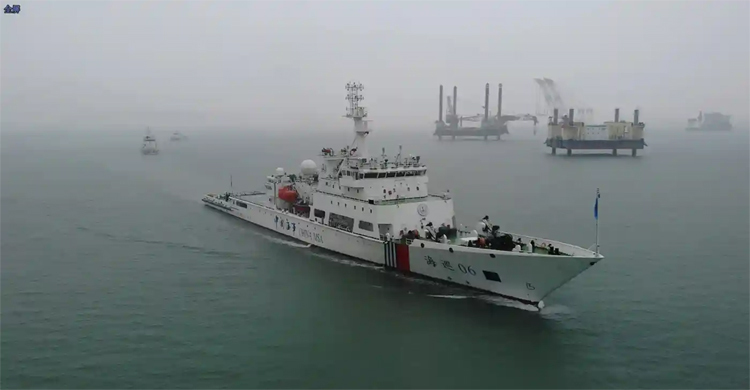China sanctions US figures after Taiwan president’s talks with House speaker

China has imposed sanctions on US figures linked to the Taiwan president’s visit to the US this week, as well as further restrictions on Taiwan’s de facto ambassador to the United States.
The sanctions targeted the Ronald Reagan library which hosted the meeting between Tsai and US House speak Kevin McCarthy, and the Hudson Institute which hosted Tsai in New York and presented her with an award.
Four US nationals were listed, including the chair and director of the Hudson Institute, and the current head and former director of the Reagan Foundation.
A second round of sanctions was also unveiled against Hsiao Bi-khim, Taiwan’s de facto ambassador to the US.
The moves come after Tsai met the US House speaker during a stopover in LA.
The sanctions prohibit the targets and their family members from entering the mainland, Hong Kong and Macau, state media reported on Friday. They also prohibit investors and firms related to the targets from cooperating with mainland organisations and individuals.
In August last year, China imposed sanctions on seven Taiwanese officials and lawmakers including Hsiao whom it accused of being “independence diehards” after then-US House speaker Nancy Pelosi’s visit to Taiwan.
Beijing considers Taiwan to be Chinese territory, to be “reunified” by force if necessary. Tsai has said Taiwan is a sovereign nation and its future is up to its people to decide.
On Friday China’s Taiwan affairs office accused the US institutions and executives of “provid[ing] a platform and convenience for Tsai Ing-wen to engage in ‘Taiwan independence’ separatist activities”.
It also announced “punishments” on a Taiwanese organisation, the Prospect Foundation, which counts former Taiwanese ministers and executives on its board, and the regional Council of Asian Liberals and Democrats, accusing them of having “gone all out to ingratiate themselves with anti-China forces”.
Chinese sanctions will have little practical impact on Hsiao as senior Taiwanese officials do not visit China, and Chinese courts do not have jurisdiction in Taiwan.
It is the latest move after China deployed People’s Liberation Army (PLA) warships through waters around Taiwan and vowed a “firm and forceful” response to Tsai meeting McCarthy.
China had repeatedly warned both sides that the meeting should not take place, and deployed an aircraft carrier strike group through waters south-east of Taiwan hours before the talks.
Three additional PLA warships, one fighter jet, and one ship-launched anti-submarine helicopter were detected near Taiwan inside its air defence identification zone on Thursday, Taiwan’s defence ministry said. A spokesman told the Guardian the ships were ones “that are normally around the Taiwan Strait”.
Japan’s ministry of defence also reported a Chinese intelligence gathering ship on Thursday, sailing between Japan’s Okinawa and Miyakojima islands, northeast of Taiwan. It also reported the return journey of a PLA Navy guided-missile frigate detected about 100km off Taiwan’s coast on Wednesday.
China also deployed coastguard vessels for unusual “board and inspect” patrols that triggered a protest from Taiwan. Taiwan’s defence ministry instructed Taiwanese vessels, including cargo and ferry services, not to cooperate with attempts by the patrol to board and inspect them.
The US called on China “to cease its military, diplomatic and economic pressure against Taiwan and instead engage in meaningful diplomacy”.
“We remain committed to maintaining open channels of communication so as to prevent the risk of any kind of miscalculation,” a state department spokesman, Vedant Patel, said on Thursday.
Tensions flared around the island last August, following a visit to the island by Pelosi. China then deployed warships, missiles and fighter jets into the waters and skies around Taiwan, its largest show of force in years.
Its response to the McCarthy meeting has so far been on a much lower level, but still left Taiwan on high alert.
Tsai said face-to-face meetings with US officials were important for “regional peace” and called on Beijing to remain calm.
“I also hope the Chinese side can exercise self-restraint and don’t overreact,” she said at a pre-departure press briefing in Los Angeles.
Source: The Guardian



